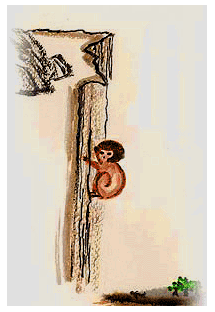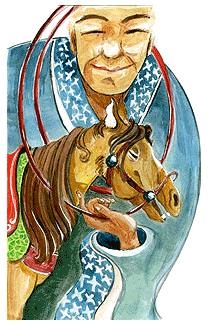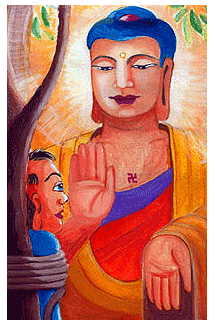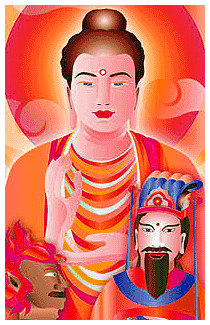Tale of a Monkey
 Once upon a time in a mountain, there lived a monkey who had great strength and wisdom, and a heart full of kindness. One day, while this monkey was climbing a tree to pick some fruits, he saw a hunter who was trapped in a deep valley and crying for help. The monkey cried, “I made a vow to be a Buddha to assist all sentient beings, if I do not save him immediately, he may die of starvation.” Once upon a time in a mountain, there lived a monkey who had great strength and wisdom, and a heart full of kindness. One day, while this monkey was climbing a tree to pick some fruits, he saw a hunter who was trapped in a deep valley and crying for help. The monkey cried, “I made a vow to be a Buddha to assist all sentient beings, if I do not save him immediately, he may die of starvation.”
The monkey climbed along the cliff to reach the bottom of the valley. He carried the hunter, climbed through the rattans and bushes and finally reached safe ground. He directed the hunter how to leave the mountain safely and wished: “I hope you will change your career of killing animals once you leave here.”
The hunter tried to catch his breath while resting, and thought, “I am weak and starving to death. I should just kill this monkey to feed myself.” So he took a rock and hit the monkey in the head. The monkey was shocked by such a sudden attack. He bled profusely and almost fainted next to a tree.
Despite the ungrateful return to his kindness, the monkey still managed to maintain a clear mind free of hatred. Instead, he felt pity and compassion towards the hunter and thought: “Today I cannot help him change his evil ways. Hopefully he will have the opportunity to meet the Buddha or a bodhisattva one day so he can learn to practice Buddhism. I hope he will never generate such evil thoughts in all his future lives.”
The monkey in this story was Buddha’s previous incarnation.
Reflection
The wise and compassionate always put the well-beings of others ahead of themselves. The ignorant and selfish only seek to satisfy themselves at the expense of others. During his many kalpas of practice, the Buddha had always managed to react to the slanders, insults and injury from the others with calm and tolerance, without a trace of resentment or a thought of revenge. The only thing that concerns the Buddha was if his enemies would one day attain Buddhahood and get ultimate liberation from anger and hatred.
We should always ask ourselves: do we argue profusely with others over the most trivial things? Are we only concerned with our own needs without the slightest care for the others’ feelings and well-being? (TOP)
|
The Water Buffalo King
 A long time ago, there lived an extraordinary water buffalo king. He had a remarkably solemn demeanor, was very kind and gentle, abounding with sympathy and compassion, and had very high morals. Because of these fine characteristics, other water buffaloes would in great numbers approach him to pay their respects and to honor him. One day, the water buffalo king and his followers went down to the riverbank in order to eat the luscious green grass that grew there. When they discovered how spacious the area was, allowing plenty of room for the water buffaloes to roam around comfortably, they ended up settling down there to live. A long time ago, there lived an extraordinary water buffalo king. He had a remarkably solemn demeanor, was very kind and gentle, abounding with sympathy and compassion, and had very high morals. Because of these fine characteristics, other water buffaloes would in great numbers approach him to pay their respects and to honor him. One day, the water buffalo king and his followers went down to the riverbank in order to eat the luscious green grass that grew there. When they discovered how spacious the area was, allowing plenty of room for the water buffaloes to roam around comfortably, they ended up settling down there to live.
Next to the river lived a macaque monkey, and on one occasion he came down to where the water buffaloes were living. When he saw the water buffalo king, he took notice of his extraordinary behavior, with his very serene nature, and surrounded by numerous followers. Seeing this made the monkey very envious, and so he started shouting all kinds of abuse towards the king. As well, he picked up stones off the ground and started throwing them at the king. He finally shouted at the king, “You get out of here! This is my territory! Take all of the other water buffaloes and leave this place at once!” After observing the situation, not only did the king not retaliate, but his heart remained free from anger. Maintaining his calm composure, he silently received all that came upon him.
A short time later, another group of water buffaloes came over to this area. When the monkey saw them, he, like before, started yelling words of insult, and again picked up rocks from the ground and threw them at the group of water buffaloes. But having witnessed the forgiving behavior of the buffalo king, they became full of respect and emulated his spirit of tolerance and acceptance. They also did not bring rise to an angry mind, instead only quietly left.
At a place not far away, there was a young water buffalo that had strayed from the herd, and was very anxious to catch up with the others. When he witnessed what had just happened, with the monkey's angry abuse and his rock throwing, a feeling of vengeance overcame him, and he wanted to fight back. But then he thought, “The elder buffaloes ahead of me were able to keep their minds undisturbed and calm, and refrained from harming their attacker. Since I am still quite young, I should follow their example of remaining calm, and not bother myself with this mischievous monkey.” So the young buffalo paid no attention to the monkey, and hurriedly continued on his way.
After walking for a short period of time, the king passed a grove of trees, and amongst these trees lived a tree god. Upon seeing the king, the tree god curiously asked, “I saw that monkey behaving so unreasonably towards you, cursing and throwing stones. Due to your great strength, you definitely wouldn't have had a problem in dealing with him. So why didn't you fight back? Instead you were silent and did not respond to him.” The king answered, “Everything in the world is subject to the principle of cause and effect. That monkey shouted abuses at me, and he will in the same abusive way treat other animals that he comes upon. But one day when the fruits of these bad deeds ripen, he will then have to face the bad consequences to his actions. Seeing him so ignorant of the law of causality and continuously doing bad things, I can’t let my compassion go out to him soon enough, how could I possibly have the heart to hurt him? Furthermore, if I really did do something to him, because my strength is so great I would surely in an instant take his life, which would therefore result in me being subjected to evil retributions in my own future. Where is the good in all of that? So we can see that maintaining self-control is really the best protection for one's own life.”
This water buffalo king was actually Shakyamuni Buddha in a previous reincarnation. Because Shakyamuni Buddha always practiced patience, tolerance and compassion, keeping his mind calm and undisturbed by any conditions that came upon him, he was finally able to reach complete enlightenment and attain Buddhahood.
Reflection
Patience and tolerance can extinguish one's anger, and increase one's concentration and wisdom. When the people around us see how patient and calm we hold ourselves, we radiate a positive influence on them through our virtuous conduct. In this inconspicuous way, we are practicing the Bodhisattva’s path. (TOP) |
The Snake’s Head and the Snake’s Tail
 In a certain place there was a snake. One day the snake’s tail said to the snake’s head, “I should be the one to lead the way.” In a certain place there was a snake. One day the snake’s tail said to the snake’s head, “I should be the one to lead the way.”
The snake’s head replied, “I’ve always been the one to decide on the direction. Why do you suddenly want to do it?”
After speaking, the snake’s head continued going forward, and completely ignored the tail.
Seeing how things stood, the snake’s tail deliberately wound itself round a tree and refused to wriggle another inch. The snake’s head pulled with all its might to no avail, and they both became exhausted.
Finally, the snake’s head gave in and allowed the tail to set the course. Intensely excited, the snake’s tail thought, “At last I am the leader!”
At this moment of utter exhilaration, the snake’s tail forgot that it did not have any eyes with which to see the road ahead, and with not an inkling of what lay ahead, slid into a roadside fire-pit, and was burned alive.
Reflection
People might laugh at the foolishness of the snake’s tail for making such a presumptuous demand. But during our daily lives, do we not also engage in arguments that gradually lead us into danger without our knowing it? (TOP) |
Tolerance Will Win Out
 One day the Buddha was giving a lecture to all the monks at Jeta Grove, Sravasti. He said that long ago the Heavenly God Indra and his host of devas waged a battle against the Asuras. One day Indra said to the King of the Asuras, “Today let us not count the victor by the amount of bloodshed. Why don’t we decide the winner by holding a debate?” In response, the King of the Asuras said, “Certainly, but who will be the judge?” Indra said, “Of the devas and of the Asuras there are beings of great wisdom and eloquence. Let us have them decide who should be victorious.” Then the King of the Asuras replied, “You may speak first.” Instead of speaking first, however, the Heavenly King humbly said, “I could speak first, but as you are the previous king of the firmament, you should have precedence. Please speak first.” One day the Buddha was giving a lecture to all the monks at Jeta Grove, Sravasti. He said that long ago the Heavenly God Indra and his host of devas waged a battle against the Asuras. One day Indra said to the King of the Asuras, “Today let us not count the victor by the amount of bloodshed. Why don’t we decide the winner by holding a debate?” In response, the King of the Asuras said, “Certainly, but who will be the judge?” Indra said, “Of the devas and of the Asuras there are beings of great wisdom and eloquence. Let us have them decide who should be victorious.” Then the King of the Asuras replied, “You may speak first.” Instead of speaking first, however, the Heavenly King humbly said, “I could speak first, but as you are the previous king of the firmament, you should have precedence. Please speak first.”
The King of the Asuras said, “A foolish person puts up with insults because of fear, and yet prides himself in believing his tolerance makes him superior to the aggressor.” Indra rejoined, “Even though a foolish person puts up with insults because of fear, being tolerant actually brings us the greatest benefits. The virtue of tolerance outweighs all the fame and fortune in the world.”
The King of the Asuras then said, “Lacking wisdom, foolish people need to be forced to do right. They are just like lazy cows that need to be prodded along by the horns of more vigorous cows breathing down their necks from behind. Hence, the best way to control the foolish is by whips and spurs.” The Heavenly King countered, “I think to control the foolish, forbearance is the best way. When confronted by an agitated person, if one can wait in peace and silence, their fury will die down naturally. A person without hatred or vexations is a saint or the disciple of a saint. This is the kind of person that we should draw close to. A person whose mind is loaded with great anger and therefore gets angry easily will encounter obstacles as high as a mountain. On the other hand, if one can control one’s anger as soon as it arises, like taming a wild horse with a harness, then one will have done a good deed.”
The devas and asuras who acted as judges for the debate thought that the arguments of King of the Asuras were based on the use of conflict and force, whereas Indra advocated putting arguments and competitions to rest with a mind free of anger and malice. In consequence, all of the judges awarded Indra the victory.
The Buddha told the monks, “Indra is freest of care in the heavens because he always practices tolerance and also praises the ways of tolerance. Likewise, if you can practice and praise tolerance, then you are truly leaving the home life.” After they heard the Buddha’s talk, all of the monks felt blessed and pledged to abide by the Buddha’s teachings.
Reflection
The Sutra of the Deathbed Injunction says, “The virtue of tolerance exceeds the virtue of upholding the precepts and practicing austerities. One who practices tolerance can be called a strong great man. If one cannot gladly tolerate the poison of being harshly insulted as if drinking honey, then one cannot be called a wise person who has realized the Way.”
All the Buddhas and Boddhisattvas practice and praise tolerance. In daily life, whether met with praise or ridicule, slander or approval, gain or loss, or pain or joy, if one stays patient and unmoved, all obstacles will fade away, and good relationships and successful undertakings will naturally follow. (TOP) |
Breadth of Mind Wins Freedom
 Long ago, Kulapati in his old age had two sons. Laid low by a chronic sickness, he enjoined his eldest son, “Your younger brother is still young. You must look after him and make sure he comes to no harm.” After Kulapati’s death, the brothers, following their father’s wishes, lived together in peace. In time, however, the elder brother’s wife started to complain to her husband, “When your younger brother comes of age he’s sure to want some of the family’s possessions. Isn’t it better to turn him out of the house now, so that we can avoid this?” At first, the elder brother did not pay heed, but eventually, worn down by the nagging of his wife, he forgot his father’s deathbed adjuration and decided to kill his younger brother. Long ago, Kulapati in his old age had two sons. Laid low by a chronic sickness, he enjoined his eldest son, “Your younger brother is still young. You must look after him and make sure he comes to no harm.” After Kulapati’s death, the brothers, following their father’s wishes, lived together in peace. In time, however, the elder brother’s wife started to complain to her husband, “When your younger brother comes of age he’s sure to want some of the family’s possessions. Isn’t it better to turn him out of the house now, so that we can avoid this?” At first, the elder brother did not pay heed, but eventually, worn down by the nagging of his wife, he forgot his father’s deathbed adjuration and decided to kill his younger brother.
One day, the two brothers walking together came to a quiet graveyard outside the city. When his younger brother was not looking, the elder brother seized him and bound him with rope to a cypress tree. Originally intending to kill him, the elder brother thought of their relationship as brothers, and didn’t have the heart to do it. Instead, he decided to abandon the young man right there, so that tigers or wolves, or perhaps ghosts would dispose of him. Finally, the elder man played a trick on the younger, “You’ve been very bad lately, so you can stay the night here as punishment. Please reflect on your wrongdoing. I’ll come back early tomorrow morning and take you home.” The elder brother left without looking back.
Under a pitch black sky, with the birds and beasts of the night screeching and howling, the young man cried out, “I’m finished! Who can help me now? Who can comfort me now?” At that moment, the Buddha in meditation saw the young man. Suddenly, the sky became bright and the ropes became loose. The Buddha came face to face with the young man and asked, “What is your wish?” The young man knew that it was the Buddha who had freed him, so he said, “May I follow the Bodhisattva Way, and attain Buddhahood in the future, and so I may liberate all sentient beings from suffering and give them true joy.” At once, the Buddha preached the Dharma and showed him the right path. After receiving the blessing of the teaching, the young man said, “Although my brother had evil in his heart and broke our father’s injunction, being ready to harm me, yet because of this, I have been able to see the Buddha and hear the Dharma, and to make vow to end the cycle of suffering. Now I should go back and repay my brother for his kindness!”
When the young man went home, his elder brother and sister-in-law were so ashamed of their wickedness that they could not face him. The young man told his elder brother, “Even though you listened to your wife’s evil words and left me to die, yet in the end you enabled me to hear the Buddha and cast off suffering. For this you have my eternal thanks.” From that time on, the younger brother began to teach the Dharma to his elder brother and sister-in-law, and they lived together in peace and harmony.
Reflection
Forgiveness can dissipate all resentment, and a thankful heart can foster tolerance. Tolerance is the glue of society, and the origin of peace. It is the author of all virtue for oneself and for everybody else. (TOP) |
Tolerance is Best
 When the Buddha was staying at the Jetavana Vihara in Sravasti, one night the Heavenly King, Indra, and the King of the Asuras, Virocano, radiating celestial light, came to pay the Buddha a visit. They respectfully prostrated to the Buddha and sat on one side. The brightness of their auras lit up the room as light as day. When the Buddha was staying at the Jetavana Vihara in Sravasti, one night the Heavenly King, Indra, and the King of the Asuras, Virocano, radiating celestial light, came to pay the Buddha a visit. They respectfully prostrated to the Buddha and sat on one side. The brightness of their auras lit up the room as light as day.
Then, the King of the Asuras said, “If one always diligently cultivates oneself , one’s wishes would certainly be fulfilled. Having attained realization, one can attain true happiness.” A little later, the Heavenly King said, “If one always diligently cultivates oneself, one’s wishes would indeed be fulfilled. If having attained success in one’s endeavor, one still practices tolerance, that is most extraordinary.”
Next, the Heavenly King asked the Buddha, “Which one of our statements is most beneficial and which one least?” The Buddha explained, “Any speech that correctly distinguishes right from wrong is beneficial. In order to pursue what is beneficial to them, sentient beings follow what they desire. As long as they put effort into their pursuit, they will gain something in return. However, what is most extraordinary is for us to keep practicing tolerance even after we have fulfilled our goal. Therefore, we should all practice tolerance.”
Both of the kings were filled with great joy after hearing the Buddha’s teaching. They prostrated to the Buddha before returning to their palaces.
Reflection
All worldly phenomena arise and cease. If we are only obsessed with our current achievements and glories, we can easily lose ourselves with success. If we do not realize the truth of impermanence, we will be worried about changes and fearful of losses. In life, we encounter good and bad fortune. Whatever the circumstances, we should remain undisturbed by the external conditions. Abiding in good thoughts and the right thoughts, we will attain true peace in body and mind. (TOP) |
